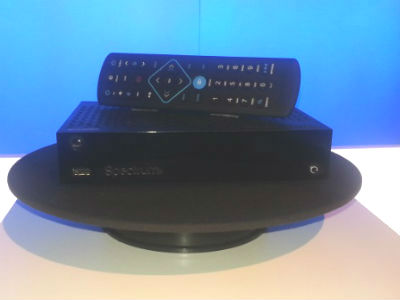Charter Worldbox Deployments Underway
The smarter way to stay on top of the multichannel video marketplace. Sign up below.
You are now subscribed
Your newsletter sign-up was successful

Charter Communications has begun to deploy its new “Worldbox” to paying customers, the MSO revealed in a recent FCC filing that updated the Commission on the MSO’s rollout of a new downloadable security platform for set-tops and other types of video devices.
While the Worldbox is a device that is being leased by the operator, industry sources also confirm that Charter and TiVo are in talks about a retail solution that would employ the new downloadable security platform.
Charter, the MSO told the FCC, “deployed its first new Worldboxes to paying customers using downloadable security in April, 2015, and continues to ramp up the deployment of the downloadable security system throughout Charter’s systems. Enabling the Worldbox in any given footprint requires changes and additions to many pieces of the video delivery system, and those deployments are underway.”
Charter declined to comment further on its rollout of the Worldbox, a hybrid IP/QAM device that has at least two approved suppliers – Humax and Cisco Systems (which is in the process of selling its set-top and CPE business to Technicolor).
The Worldbox runs Charter’s new cloud-based Spectrum Guide, developed with ActiveVideo (Charter and Arris now own ActiveVideo via a joint venture). Charter has been testing the UI in Fort Worth, Texas, and has expressed plans to test it in markets such as Reno, Nev., and St. Louis.
Charter mentioned the Worldbox deployment update in a semi-annual report that it must file with the FCC per a condition for a waiver the MSO obtained in 2013 that allowed Charter to use dual-mode boxes equipped with integrated security and the operator’s new downloadable platform. Per the filing, Charter has deployed more than 2.67 million STBs with integrated security covered by the waiver as of June 30.
A condition of that waiver also requires Charter to engage in “good faith negotiations” with a CE manufacturer that intends to develop a set-top box to be sold at retail in the U.S. that uses Charter’s downloadable security system.
The smarter way to stay on top of the multichannel video marketplace. Sign up below.
Regarding that status, Charter said talks with a CE manufacturer commenced in 2013 and that those talks are ongoing. Charter noted that it is “now awaiting further progress on technical details,” adding that talks with additional CE manufacturers commenced in the second quarter of 2015.
It appears that TiVo is one of the CE companies involved in those discussions.
TiVo, in a separate FCC filing about the company's interest in seeking clarity on cable’s ongoing support of CableCARDs, offered this nugget: “The TiVo representatives also responded to questions about discussions with Charter Communications concerning the use of Charter’s downloadable security solution in TiVo’s retail products as envisioned in the 2013 Order granting Charter a waiver of Section 76.1204(a)(1) of the Commission’s rules.”
Charter and TiVo declined to comment on any specific discussions pertaining to downloadable security, but industry sources confirmed that the two sides are talking about a retail-facing approach.
A retail agreement could tie up some loose ends. Charter stopped leasing TiVo boxes about two years ago (that tied into an agreement between them that was announced in January 2011), but how those two companies might continue to work together has been a lingering question ever since.
Charter’s development and deployment of a downloadable security system for set-tops and other video devices comes amid a backdrop in which an FCC-appointed committee mulls a potential successor to the CableCARD. That group, called the Downloadable Security Technology Advisory Committee (DSTAC), is tasked with filing its recommendations to the FCC by September 4, though consensus on a unified approach has proved elusive thus far (subscription required).
Charter plans to expand the deployment of the new UI and Worldbox to systems that are coming way of its proposed acquisition of Time Warner Cable and Bright House Networks.
Charter confirmed earlier this year (subscription required) that it has licensed the Reference Design Kit and has established two parallel development tracks: one that factors in its current technical approach and one that also includes the RDK, a preintegrated software stack for video and broadband devices that’s being managed by Comcast, TWC and Liberty Global.
